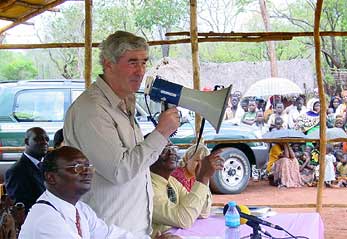Lubbers discusses Burundi returns from Tanzania
Lubbers discusses Burundi returns from Tanzania

DAR ES SALAAM, Tanzania, Nov 10 (UNHCR) - UN High Commissioner for Refugees Ruud Lubbers today appealed to the Tanzanian government to continue its long-standing tradition of hospitality to refugees, the majority of whom are from Burundi. He urged the government not to stain its outstanding record of asylum by imposing more restrictive policies on the movement of refugees.
High Commissioner Lubbers, on the second leg of a four-nation visit to Africa, was speaking to Tanzania's Foreign Minister, Jakaya Kikwete, about new measures which have curbed the movement of more than 480,000 Burundian and Congolese refugees living in 12 camps along Tanzania's western border.
"The last chapter in the history of Burundian refugees in Tanzania should not be blemished by stricter measures that have been imposed on refugees living in camps in western Tanzania," Lubbers told the Foreign Minister in the Tanzanian capital, Dar es Salaam. He called on the government to review the new policies or reinstate previous practices so that "together we can be proud of the refugee programme."
The new measures instituted by government authorities in camps in western Tanzania now confine refugees to their camps. Prior to these restrictions, authorities had for years allowed refugees to move freely within a four-km radius of the camps. Many refugees had used this opportunity to go out to cultivate and engage in other activities to supplement their food and other needs. Markets which had facilitated trade between refugees and local communities have also been discontinued in some areas.
On the possible voluntary repatriation of Burundian refugees in Tanzania, Lubbers told Kikwete that the UN refugee agency was ready to expand its voluntary return programme to Burundi, noting that a UNHCR planning meeting was scheduled to be held in the Burundian capital, Bujumbura, next week to discuss a possible expansion.
Since March 2002, UNHCR has assisted the voluntary return of nearly 60,000 Burundian refugees to the relatively safe northern provinces of Muyinga and Ngozi through the Kobero crossing point in north-eastern Burundi. A second crossing point at Gahumo was recently opened to aid the return of refugees going back to Cankuzo province in the east.
Currently, eight out of 16 provinces in Burundi are still considered unsafe, confining most of the UNHCR reintegration and repatriation activities to the northern provinces. Lubbers assured the Tanzanian Minister that an assessment of the security situation in the south would be made to enable staff of the refugee agency to be deployed to monitor possible returns, particularly to the southern provinces.
Speaking to Burundian President Domitien Ndayizeye in Bujumbura before travelling to Tanzania, Lubbers said, "I am here to consolidate a positive process, because building peace has come now to such a level that it has become possible for us to advise people, to inform them that it is safe enough to come back."
Addressing the press, High Commissioner said he had been speaking to the Resident Co-ordinator of the UN team about Burundi's security phases, "which has to be changed in such a way that we can be present at the border and in the field."
"We have prepared ourselves in terms of logistics and in terms of organisation," said Lubbers. "We need last checks on the security and political clearance. I think it is a question of weeks and we will see many Burundians back home."
While in Tanzania, the High Commissioner met with Burundian and Congolese refugee leaders in Kigoma, western Tanzania. He also visited Chogo, a new refugee settlement established by the government of Tanzania and UNHCR to integrate more than 3,000 Somali Bantu refugees.
He will leave for Sudan on Tuesday, where he is scheduled to visit a camp for internally displaced people, a refugee camp and a transit centre for Eritrean refugees about to return home. On Thursday, he will travel by road from Sudan to Tesseney, Eritrea, and meet the Eritrean President, Isaias Afewerki, before returning to Geneva on Saturday.








